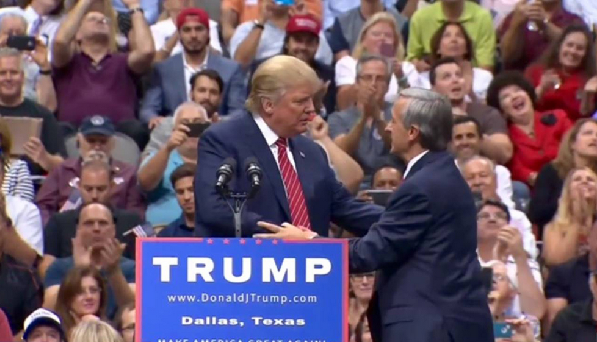Donald Trump has vowed to “destroy” federal rules prohibiting religious groups from engaging in partisan politics.
Politically conservative Christians may favor the idea of church and state being connected at the hip. They may perceive it as translating into more power for their causes.
But there are others who dread how it may instead warp the character of churches while doing absolutely nothing to improve government.
“It’s not going to bring civility or a moral compass to government, but it would do a lot to diminish the moral compass of churches,” said Bill Stanfield, the CEO of Metanoia, a faith-based nonprofit that provides housing, job creation, community improvements and other ministries in North Charleston, S.C.
Trump got the controversy rolling last week in remarks he made at the National Prayer Breakfast. The president promised to allow churches to engage in politics.
“I will get rid of and totally destroy the Johnson Amendment,” he said.
The Johnson amendment, named after Lyndon B. Johnson when he initiated the measure as a U.S. senator, was enacted in 1954 and prohibits 501(c)3 groups from participating in political action.
It forbids churches, universities and charities from endorsing or opposing candidates or contributing to their campaigns. The amendment does, however, allow churches to engage in voter education initiatives.
Violation of the measure risks the tax-exempt status these groups enjoy.

President Trump wants to “destroy” tax law that prevents churches and nonprofits from engaging in open political activity. First Baptist Dallas pastor Robert Jeffress, seen here at a Trump rally, was a vocal supporter of Donald Trump.
The Washington Post reported that the president views the ban “as a restriction on the freedom of faith groups to put their religion into action, if their religion calls on them to campaign for a candidate,” the newspaper said.
The Post also explained that repealing the amendment requires action by Congress because it is part of the tax code.
But the newspaper noted that Trump can get around the requirement by directing the Internal Revenue Service not to enforce it.
If that happens, it won’t change anything for some religious groups.
“I have been approached by politicians seeking endorsement,” Stanfield said. “We have never endorsed — and won’t endorse.”
Metanoia has long practiced keeping its partnerships with local and federal government organizations separate from its religious underpinnings, Stanfield said.
Some of its asset-based, community-driven work is funded with federal housing grants, which is allowed under the law.
It’s also acceptable to appeal to public officials to seek government partnerships when attempting to address solutions to systemic challenges in communities.
“Churches and organizations ought to be engaged around issue-based advocacy and to say we want our public officials to think about these particular issues in particular ways,” Stanfield said. “But that’s different than saying we like a certain mayor and that you ought to vote for that person.”
It’s common to invite politicians to a ribbon-cutting ceremony on a project they have been involved in, he said.
“But upfront support for them gets into being compromised.”
That’s the case because agreement between churches and politicians can sour, he said. That puts congregations in a bind if they want to then speak against a politician or her or his policies.
“Then we have lost our voice,” Stanfield said.


